
"When Doves Cry" is a song by American musician Prince, and the lead single from his sixth studio album Purple Rain. According to the DVD commentary of the film Purple Rain (1984), Prince was asked by director Albert Magnoli to write a song to match the theme of a particular segment of the film that involved intermingled parental difficulties and a love affair. The next morning, Prince had composed two songs, one of which was "When Doves Cry". According to Prince's biographer Per Nilsen, the song was inspired by his relationship with Vanity 6 member Susan Moonsie.

"Mountains" is a 1986 song by American musician Prince and The Revolution, from his eighth album, Parade (1986), and the soundtrack to the film Under the Cherry Moon. It was written by The Revolution members Wendy & Lisa together with Prince. The extended 12" single version of the song runs nearly ten minutes. It reached number 23 in the US but only 45 in the UK. The B-side was the instrumental "Alexa de Paris", one of the few tracks from this project featuring a guitar solo. Both songs appear in the film Under the Cherry Moon, with the video for "Mountains" playing as the credits roll. The version shown on MTV to promote the single was in color as opposed to the film's black-and-white version.
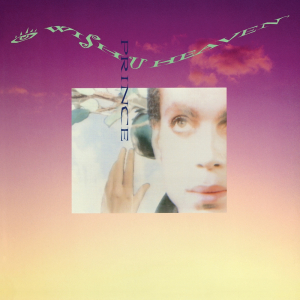
"I Wish U Heaven" is a song by Prince, and the third single from his 1988 album, Lovesexy. The 12" single is a substantially extended three-part suite which runs over ten minutes. This song was a replacement for "The Line", an upbeat jam featuring Boni Boyer and Sheila E. on backing vocals. "I Wish U Heaven" is a joyful, spiritual song with few lyrics

"The Arms of Orion" is a 1989 song by American musician Prince and Scottish singer and actress Sheena Easton. It was the third single to be taken from Prince's 1989 Batman soundtrack album. It was a #36 pop hit for them on the Billboard Hot 100 charts in 1989.

"1999" is a song by American musician Prince, the title track from his 1982 album of the same name. Originally peaking at number 44 on the Billboard Hot 100, a mid-1983 re-release later reached number 12 in the US, while a January 1985 rerelease, a double A-side with "Little Red Corvette", later peaked at number 2 in the UK.
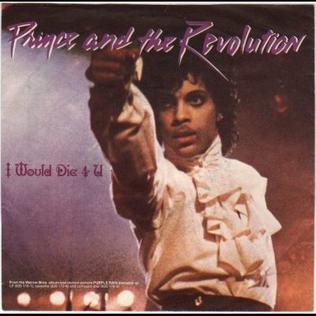
"I Would Die 4 U" is a song by Prince and the Revolution, the fourth single in the US from their 1984 album, Purple Rain. The up-tempo dance song was a top 10 hit—the final one from the album—in the US, reaching number 8 on the Billboard Hot 100.

"Let's Go Crazy" is a 1984 song by Prince and The Revolution, from the album Purple Rain. It is the opening track on both the album and the film Purple Rain. "Let's Go Crazy" was one of Prince's most popular songs, and was a staple for concert performances, often segueing into other hits. When released as a single, the song became Prince's second number-one hit on the Billboard Hot 100, and also topped the two component charts, the Hot R&B/Hip-Hop Songs and Hot Dance Club Play charts, as well as becoming a UK Top 10 hit. The B-side was the lyrically controversial "Erotic City". In the UK, the song was released as a double A-side with "Take Me with U".

"Little Red Corvette" is a song by American recording artist Prince. The song combines a Linn LM-1 beat and slow synth buildup with a rock chorus, over which Prince, using several automobile metaphors, recalls a one-night stand with a beautiful promiscuous woman. Backing vocals were performed by Lisa Coleman and Dez Dickerson; Dickerson also performs a guitar solo on the song.
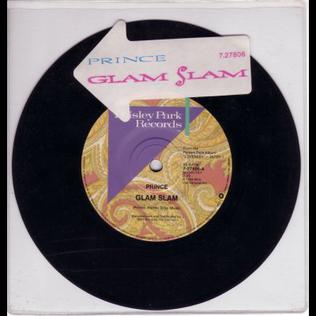
"Glam Slam" is a song by American musician Prince, and the second single from his tenth album, Lovesexy (1988). The song has sexual overtones with a spiritual undertone and fits the Lovesexy theme of integrating God and sex. The song is complex musically, recalling "Life Can Be So Nice" from Parade. It ends with a chorus of strings. A 12" single remix of the song by Shep Pettibone and Steve Peck mainly includes dance beats and extra instrumentation and samples.

"Take Me with U" is a song by Prince and the Revolution, and the final US single released from their album, Purple Rain (1984).

"Controversy" is a song by American musician Prince, the lead single and title track to his 1981 album. The song addresses speculation about Prince at the time such as his sexuality, gender, religion, and racial background, and how he could not understand the curiosity surrounding him.

"Paisley Park" is a 1985 song by Prince and The Revolution. It was the first single released in some international markets from their 1985 album, Around the World in a Day and so is also the album's last single internationally. "Paisley Park" was recorded 3 months after the Purple Rain album was released. Violin on the song was played by Novi Novog, and Wendy & Lisa provide backing vocals. The rest of the song was performed by Prince. The song reached the Top 40 in all of the countries it was released in. It peaked within the Top 20 in both Ireland and the UK.
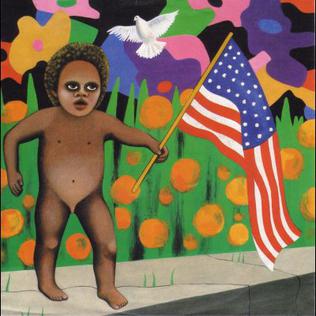
"America" is a song by Prince and The Revolution. It was the final US single from the group's 1985 album, Around the World in a Day.

"Let's Pretend We're Married" is a song by American musician Prince from his 1982 album 1999. It was the final US single from the album and peaked at number 52 in the US.

"Uptown" is the lead single from Prince's third album, Dirty Mind. Beginning with a lone drum intro, the track explodes into the keyboards of the chorus. The verses feature a more prominent funk guitar. The song breaks down to a more instrumental section toward the end that mainly consists of guitar, bass and drums with an occasional keyboard riff. The minimalist style of the song is representative of most of the Dirty Mind album. The song addresses the Uptown neighborhood of Minneapolis that was the city's hang-out spot for artists.
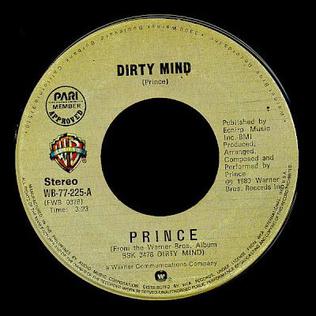
"Dirty Mind" is the follow-up single in the US, and title track to Prince's third album, released in 1980. The song is built around a keyboard riff created by Doctor Fink, which dominates the song. The demo-like song lacks a chorus, and is a stark departure of the smooth R&B sound of Prince's first two albums. The lyrics concern sexual thoughts, which are fairly representative of the other songs from the album. The single's B-side is the ballad "When We're Dancing Close and Slow", from the previous year's Prince. "Dirty Mind" reached number sixty-five on the soul chart. Along with the tracks "Uptown" and "Head", "Dirty Mind" reached number five on the dance chart.

"Gotta Stop (Messin' About)" is a song by Prince, released in the UK as a follow-up single to support his third album, Dirty Mind. The single was not an album track, though it was written at the same time, and possessed a similar sound. "Gotta Stop Messin' About" marked the first time Prince released non-album tracks, which, especially as B-sides, would become a prominent part of his career.

"Thunder" is a song by American musician Prince and the New Power Generation, from their 1991 album Diamonds and Pearls. It was issued as a limited, individually numbered 12-inch single picture disc in the UK and Ireland only, and the edited version was available only on the promotional single.
"Private Joy" is a song by American musician Prince from his 1981 album Controversy, released as the B-side of the single "Do Me, Baby". The song describes how Prince will never reveal the identity of his secret lover. This is the first time Prince used the LM-1 machine, which he would use throughout his career.
"When You Were Mine" is a song written and released by Prince on his 1980 album, Dirty Mind. Though not released as a single, the song received a promotional 12" release. "When You Were Mine" was later the B-side for Prince's "Controversy" single in 1981.


















